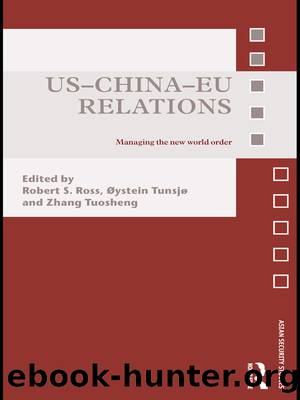US-China-EU Relations by Ross Robert;Tunsjø Øystein;Tuosheng Zhang;

Author:Ross, Robert;Tunsjø, Øystein;Tuosheng, Zhang;
Language: eng
Format: epub
Tags: Interdisciplinary Studies
Publisher: Taylor & Francis Group
Published: 2010-02-08T00:00:00+00:00
The mix of positive and negative factors, 2008â9
A prudent assessment of the outlook for USâChina relations in 2008â9 includes efforts by both governments to continue positive engagement involving respective Gulliver strategies to tie down the other powerâs possible negative actions or initiatives. Other contingency plans and hedging, notably involving the Chinese and US military build- ups in Asia, appear very likely to continue. Prevailing circumstances indicate that significant advances in cooperation will be modest at best.
General areas of possible improved cooperation include both countriesâ broad interest in promoting peace and development in Asian and world affairs, and their respective commitments to easing the world economic crisis and sustaining and advancing free and open international trade, investments and other economic interchange. The two sides probably will try to continue cooperation to manage North Koreaâs nuclear weapons program. They will be likely to continue to cooperate in the war on terrorism and in supporting stability in Pakistan. Eased tensions in TaiwanâChinaâUS relations over cross-strait issues could provide an opportunity for greater USâChina cooperation, though much depends on how the new administration of President Ma Ying- jeou in Taiwan deals with cross- strait issues and how China reacts in adjusting its coercive pressure and positive incentives toward Taiwan.
The improvement in the atmosphere surrounding ChinaâJapan relations and the growing interest of these two governments and that of the United States in closer dialogues with one another has piqued interest in a possible official or semi- official trilateral USâJapanâChina dialogue.35 Advantages of such trilateral dialogue may be limited and mainly symbolic. The level of trust and strategic closeness among the three governments varies widely. In particular, the United States and Japan have viewed each other as close strategic partners as they have sought to work closely together in order to deal with the adverse and other consequences of Chinaâs rising power and influence in Asian and world affairs. Both Washington and Tokyo have had much less trust in their respective relationships with China, and China has appeared to reciprocate.
Prospects for modest advances in USâChina cooperation also involve a range of important transnational issues including proliferation of weapons of mass destruction, illegal drugs, peacekeeping, and transnational threats from disease, disasters and crime syndicates. Similarly modest expectations characterize likely USâChina cooperation over Sudan, Iran and Burma. Also, there possibly could be progress and more cooperation on issues in environmental protection and climate change
Download
This site does not store any files on its server. We only index and link to content provided by other sites. Please contact the content providers to delete copyright contents if any and email us, we'll remove relevant links or contents immediately.
The Rape of Nanking by Iris Chang(3518)
The Sympathizer by Viet Thanh Nguyen(3483)
World without end by Ken Follett(3006)
Ants Among Elephants by Sujatha Gidla(2925)
Blood and Sand by Alex Von Tunzelmann(2609)
Japanese Design by Patricia J. Graham(2556)
City of Djinns: a year in Delhi by William Dalrymple(2136)
Inglorious Empire by Shashi Tharoor(2102)
Foreign Devils on the Silk Road: The Search for the Lost Treasures of Central Asia by Peter Hopkirk(2056)
In Order to Live: A North Korean Girl's Journey to Freedom by Yeonmi Park(2053)
Tokyo by Rob Goss(2018)
India's Ancient Past by R.S. Sharma(1988)
India's biggest cover-up by Dhar Anuj(1983)
The Great Game: On Secret Service in High Asia by Peter Hopkirk(1961)
Tokyo Geek's Guide: Manga, Anime, Gaming, Cosplay, Toys, Idols & More - The Ultimate Guide to Japan's Otaku Culture by Simone Gianni(1947)
Goodbye Madame Butterfly(1934)
The Queen of Nothing by Holly Black(1754)
Living Silence in Burma by Christina Fink(1731)
Batik by Rudolf Smend(1720)
